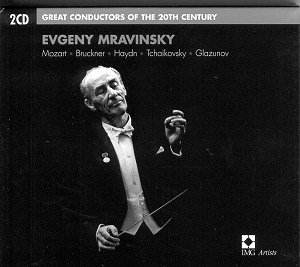Evgeny Mravinsky was a remarkable man. His leadership
of the Leningrad Philharmonic Orchestra from 1938 to 1988, a full
half-century, enabled him to build the ensemble into one of the
great orchestras. His knowledge of and special relationship with
Shostakovich is the stuff of legend, and he premiered no less
that six of that composer’s symphonies. Alas, no Shostakovich
on this occasion, rather a fascinating selection of composers
ranging from Haydn to Bruckner and Glazunov.
The performance of the Don Giovanni Overture
that opens proceedings is typical of Mravinsky’s art: drilled
to within an inch of its life (some really sensational string
articulation), it nevertheless holds the drama so strongly it
is easy to believe the opera will follow. That Mozart came from
November 1968 – in the previous February, Mravinsky and his Leningrad
forces gave the Bruckner Seventh given here (both were previously
available on Russian Disc RDCD10911, 1995).
The Seventh is glorious on many counts. The pacing
of the first movement is natural, the whole unfolding beautifully
and inevitably. How lovely to hear the authentically Russian acidic
oboe and the vibrato-ed trumpets. Contrasts are stark, and Mravinsky’s
control of his instrument (the Leningrad Phil) is extraordinary.
Listen to the way that crescendi are layered, each making its
effect viscerally and yet each realising its place within the
whole. Admittedly there is very little sunshine coming through
the clouds in this first movement, and there are some problems
with ensemble and tuning (especially form the flutes), but there
is no denying the intensity. Neither is there any denying the
depth of emotion of the mighty Adagio, which flows with just the
right amount of plasticity. There is plenty of sensitivity to
the phrasing (especially from the strings), but unfortunately
the whole is marred by an unrelenting climax, with speed picking
up as the intensity rises.
The Scherzo is, admittedly, marked, ‘Sehr schnell,’
which for Mravinsky means taking the listener on a fast ride in
a fast machine, with a Trio that tends towards over-indulgence.
The qualities that distinguished the first movement return in
the finale, however: there is more give and take here, more wonderfully
intense string playing and the brass section positively glows.
The speed takes little heed of Bruckner’s own warning ‘doch nicht
schnell’, though: fast this certainly is. The closing pages are
resplendent. In fact, why is the applause not more enthusiastic?.
Mravinsky’s Haydn could hardly be expected to
hail from the authenticist school, and so it is. The Allegro is
serious and accurate, the Largo slow and notable primarily for
a tremulous oboe. The Minuetto, no dance here, is almost martial,
while the trio needs a strong injection of lilt. I think
the finale is Mravinsky trying to be jovial, but it is difficult
to tell!.
Tchaikovsky’s Francesca da Rimini comes
across as a masterpiece in Mravinsky’s hands, right from its highly
dramatic beginning, with its huge, grey shadows, all the way through
its stormy, gestural world. Here is the highlight of the set,
a performance which justifies the financial outlay of both discs.
The piece does not sound at all diffuse in Mravinsky’s hands (his
Tchaikovsky is legendary) and the virtuoso excitement as the piece
moves towards its climax is almost unbearable.
Glazunov’s Fifth Symphony is a wonderful work.
Take Glazunov on his own terms, and a world of wonders awaits
you, and that is exactly what Mravinsky does. In programming these
discs, maybe EMI took a risk in placing this piece last, but it
certainly paid off hugely. Mravinsky sits inside Glazunov’s conservative
romanticism most convincingly.
The Scherzo, placed second, is sparkling, glittering
music which is played with as much affection as Mravinsky could
probably muster. Glazunov’s witty, balletic side is to the fore
here. The Andante’s more serious undertones are highlighted by
Mravinsky, so that the movement threatens to turn into Wagner
(c5’30), but the music turns and the Russian ballet soon returns
to dispel this idea. The glittering, jubilant finale is the perfect
end to this set that contains so many gems of this master’s art.
Recommended.
Colin Clarke
Great
Conductors of the 20th Century

